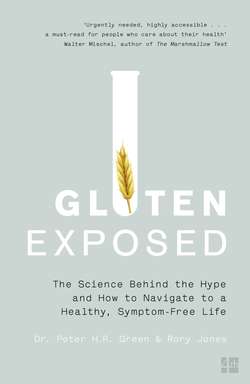Читать книгу Gluten Exposed: The Science Behind the Hype and How to Navigate to a Healthy, Symptom-free Life - Rory Jones, Dr. Green Peter - Страница 19
Laxatives in Your St. John’s Wort?
ОглавлениеA 2015 Canadian study tested popular herbal supplements and found that many of the bottles contained pills that were diluted or contained none of the product listed on the label. Others consisted entirely of fillers such as soybeans, wheat, and rice—ingredients that were not necessarily on the label. These were the only “plants” in the pill. One bottle of St. John’s wort, the New York Times reported, “contained only Alexandrian senna, an Egyptian yellow shrub that is a powerful laxative.” Other supplements contained walnuts, potentially deadly for people with nut allergies. This study suggests that the problem may be widespread. It is especially troubling for those with a severe food allergy or requiring a strict gluten-free diet.
This study and others prompted the New York State attorney general in 2015 to issue a cease-and-desist order to several large chains selling supplements, requiring them to withdraw the products. He was joined by other state agencies. The aim of the initiative is to require manufacturers to address their own product issues so that supplements are not pulled from store shelves after they have done harm.
If you are currently gluten-free and suddenly have a return of symptoms, you may need to look at the supplements you take instead of what you had for dinner the night before. Unfortunately, inspecting the label may not help—the “FACTS” section of a supplement label may show the product contains very little or none of this important “ingredient.”
Another study published in the Journal of the American Medical Association found that half of the FDA Class I recalls between 2008 and 2012—where there is a “reasonable probability that [their use] will cause serious adverse health consequences or death”—were supplements. And about two-thirds of the recalled dietary supplements that were analyzed still contained banned drugs at least six months after being recalled. These banned and/or prescription-only drugs found in supplements included:
Sibutramine—a weight-loss drug that was withdrawn from the U.S. market in October 2010 since it is known to substantially increase blood pressure and/or pulse rate and may present a significant risk of heart attack and stroke in some people.
Sildenafil—used for erectile dysfunction, it can cause hearing loss and low blood pressure and reacts with a number of other prescription drugs.
Fluoxetine—trade name Prozac, this drug is sold only by prescription.
Phenolphthalein—formerly the main component in laxatives, such as Ex-Lax, banned by the FDA in 1999 for sale in the U.S. due to the risk of causing cancer with long-term use.
Aromatase inhibitor—used by prescription only in breast cancer treatments to lower estrogen levels.
Various anabolic steroids.
A September 2015 recall by the FDA is particularly sobering. Two weight loss supplements were found to contain both sibutramine and phenolphthalein—neither of which were listed on the label. They were marketed under the names Pink Bikini and Shorts on the Beach and sold online. The FDA also noted that “these products may also interact in life-threatening ways with other medications a consumer may be taking.”
Most of the FDA-recalled supplements were for bodybuilding, weight loss, and sexual enhancement. If you use these products, you may be getting an enhancement in the form of side effects you did not bargain for. Supplement labels may hide more than that pink bikini can.
